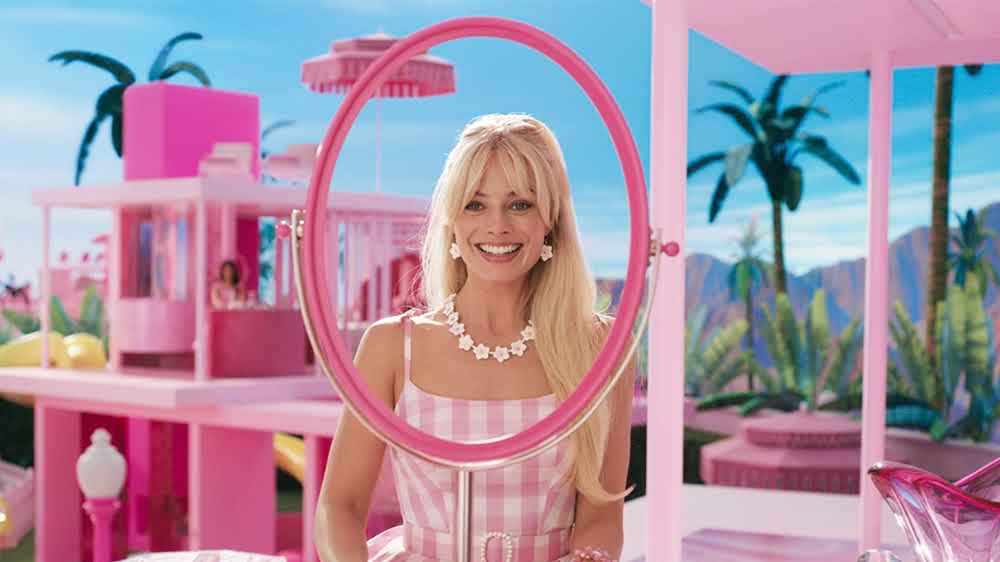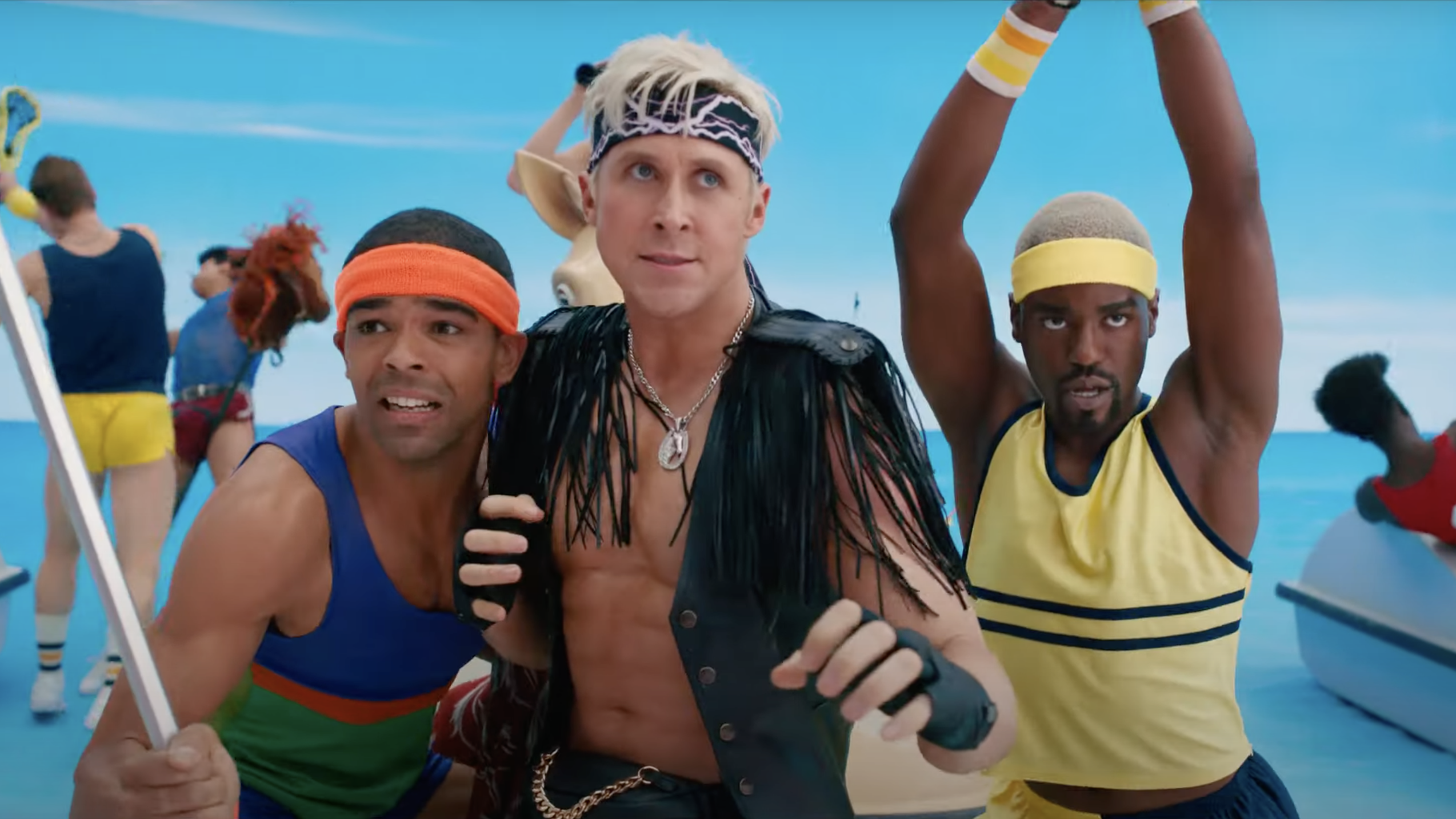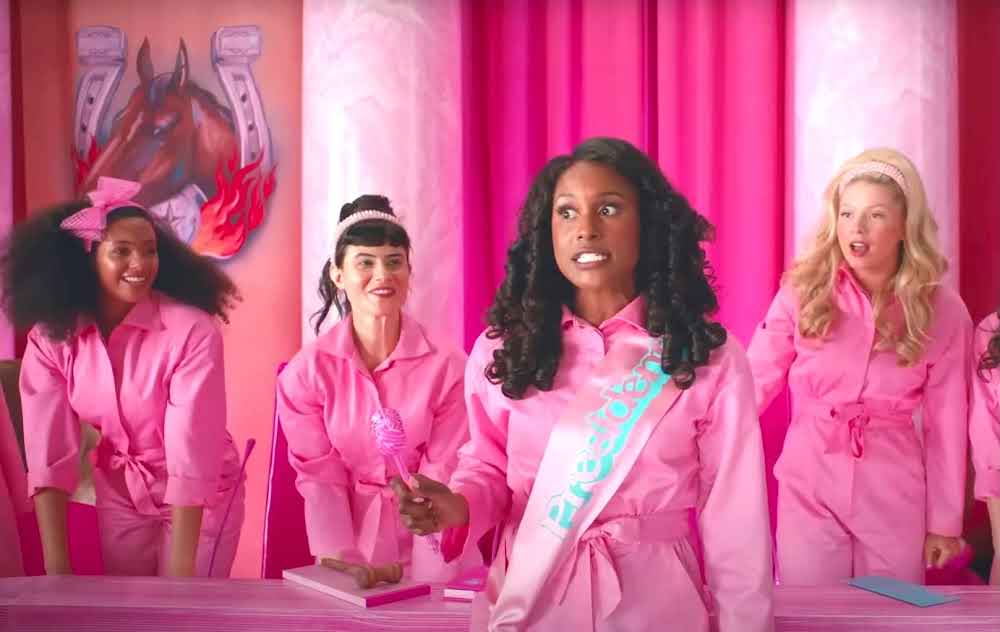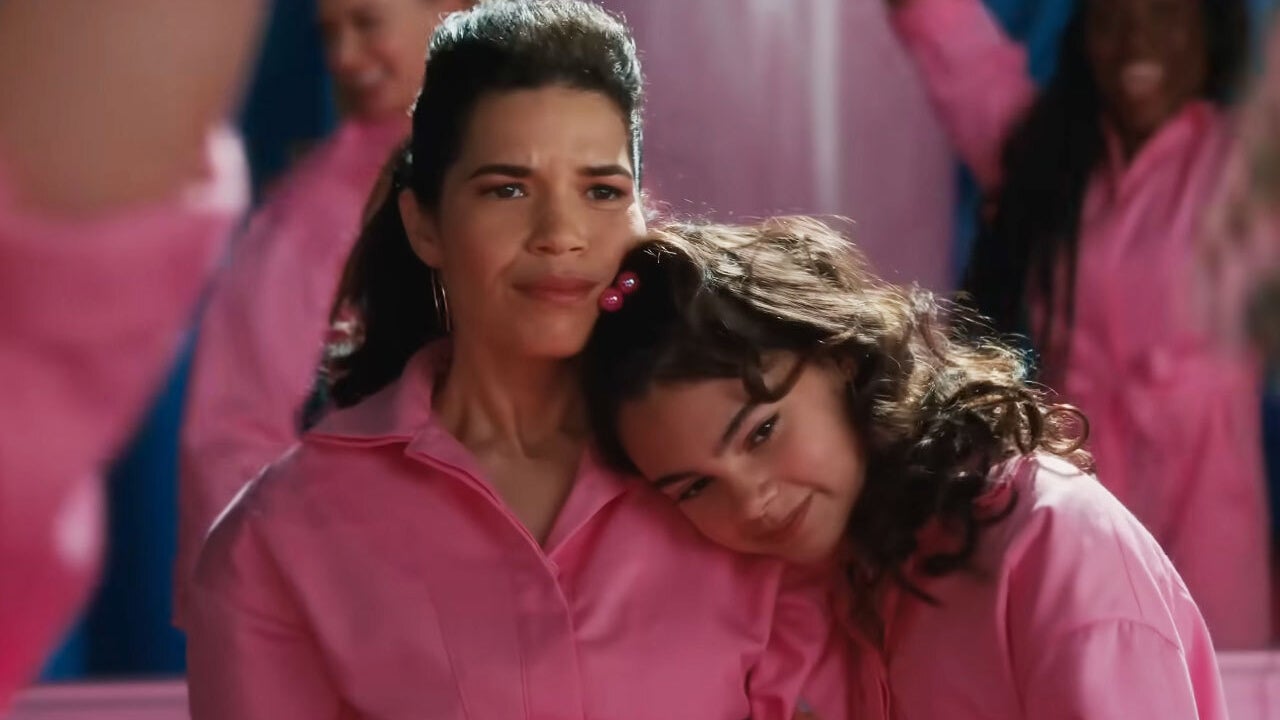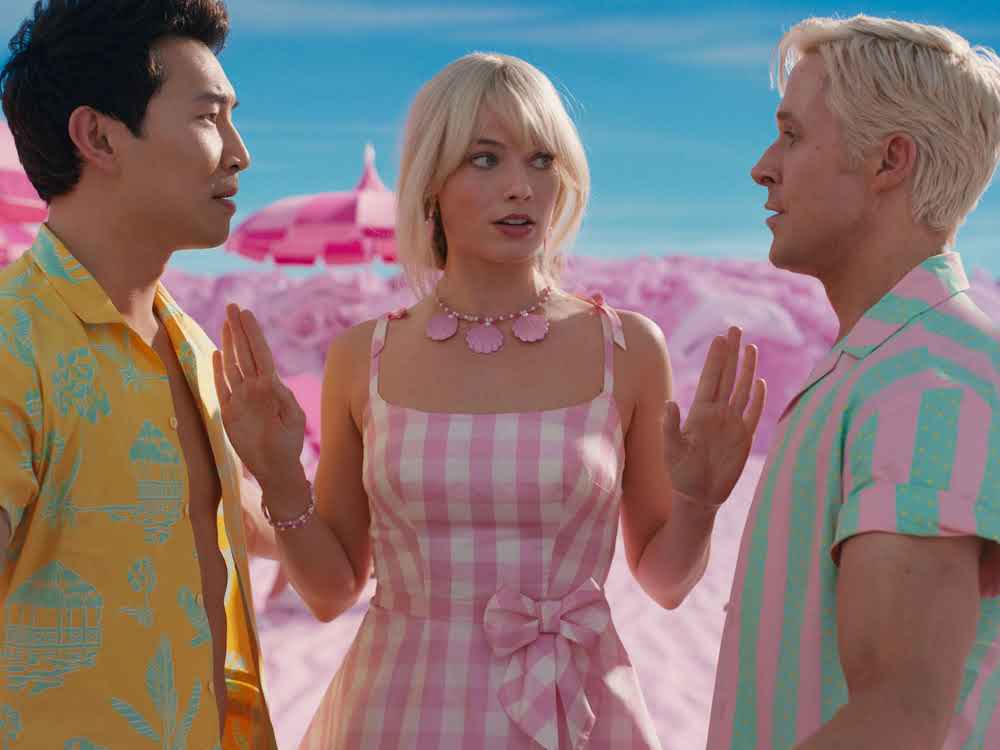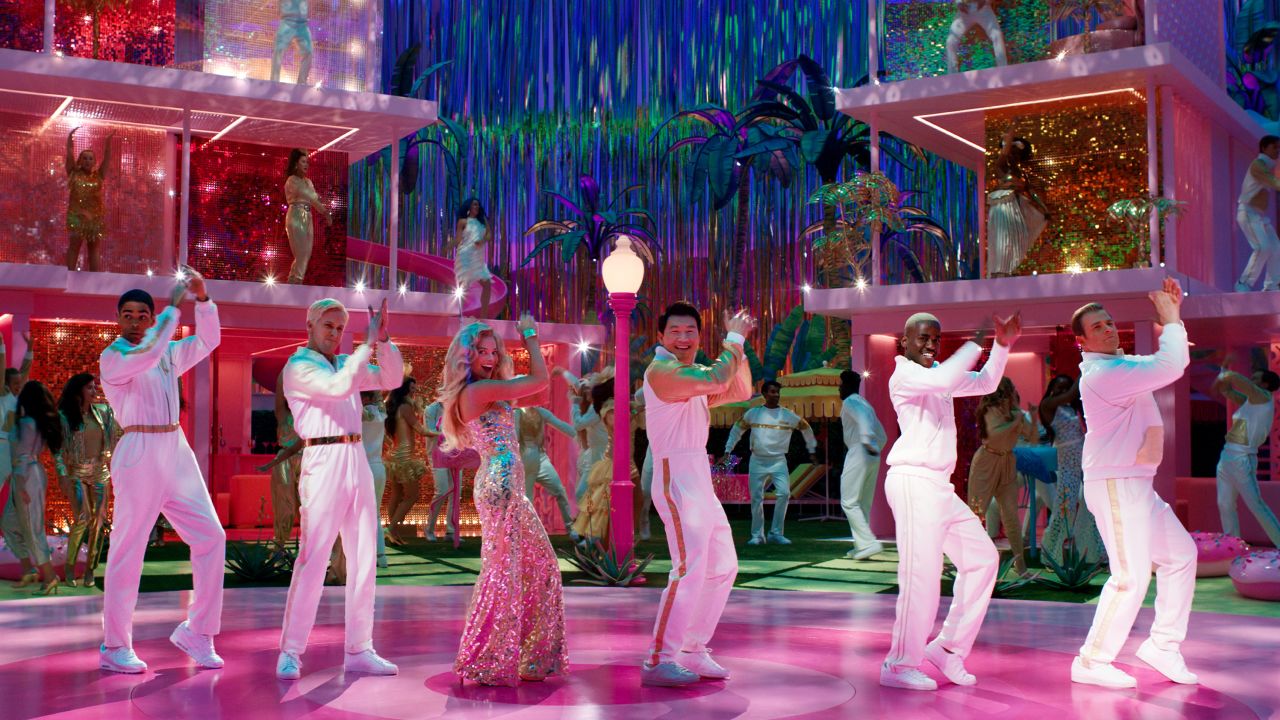KV: With the Barbenheimer craze sweeping the world and cascades of hot pink adorning movie theatres, shops, and Instagram posts alike, it has been hard to avoid the feeling that some sort of edict has been issued to all of us as god-fearing citizens of the internet (and what remains of the rest of the planet) to see and love at least one of Barbie or Oppenheimer. For this reason, I have personally felt some belligerent reluctance to give in and see either of them. Give in, however, is exactly what Zoe and I did this past weekend, when we dragged our weary bodies over to the cinema and watched Greta Gerwig’s Barbie.
There is a lot to say about this movie, not least of which is that in many ways it is a big advertisement for products that entrench the kind of prescriptive ideas about women that the movie purports to critique. For all of its self-awareness and gentle jabs at Mattel, what remains is a movie funded by and advertising a toy company, and filled with beautiful people being gorgeous at each other for nearly two hours, while occasionally saying some vaguely feminist-sounding stuff. Nevertheless, there was also a fair bit to enjoy – the movie looked bright, shiny, and fun throughout, with both Margot Robbie and Ryan Gosling nailing the brief. There were some disarmingly funny moments, and goddamn it if it didn’t make me a little misty-eyed about the sisterhood from time to time. Zoe, care to take our gentle reader through the plot?
ZA: Luckily, I am in my Movie Reviewer Barbie era so I would be delighted to. We open with a Helen Mirren–narrated sequence, an homage to 2001: A Space Odyssey, with Robbie’s Barbie in place of the monolith, and nondescript old-timey little girls in place of the humanoid apes. This sets up the overarching idea which the film ultimately leaves cynically ambiguous, that Barbie changed and continues to change the world.
We then jump into Barbieland, where Robbie’s Barbie (known as “Stereotypical Barbie”) goes about her perfect day, waking up in her Barbie Magic Dream House, greeting the various other Barbies and Barbie-affiliated characters, culminating at the evening disco party where Robbie’s Barbie posits the question “Do you ever think about dying?” to a stunned reception. This existential dread is just the beginning for Stereotypical Barbie, who wakes up the next day to a series of upsets, most notably cellulite and flat feet (a dread worse than death for a Barbie or a women in general). Stereotypical Barbie must consult Weird Barbie (Kate McKinnon) who advises her that these incidents are caused by unrest in the Real World with the person that plays with Robbie’s corresponding doll, and the only way to avoid becoming a Weird Barbie herself is to travel to the Real World and remedy the problem. The laws that govern these dual worlds are a bit murky in the film. They seem to have reciprocal impacts, but at other times, no impact on each other at all.
Barbie travels to the Real World with her Ken (against her wishes) with the understanding that Barbieland, a pink utopia that celebrates and uplifts women and femininity, reflects the Real World, in large part, due to Barbie’s influence on both. Arriving in the Real World, Barbie and Ken find an equally cartoonish depiction of the patriarchy, which horrifies and delights the pair respectively. Here, Barbie links up with the mother/daughter duo who own her doll, Gloria (America Ferrera) and Sasha (Ariana Greenblatt), and the all-male Mattel executive board, lead by Will Ferrell doing what he does best: Will Ferrell.
Barbie, with the help of her friends, must figure out how to save herself (and Barbieland), and in the process contend with who she is and her autonomy to go beyond the label of Stereotypical Barbie.
I think that’s the crux of it, Katie. What are your thoughts?
KV: Oh man, this film made me feel so tired to be honest. It made me think constantly about the patriarchy, while failing to provide much hope for improvement or positing any convincing solutions to any problems that beset women. And look, I know it’s unfair to expect what is essentially a children’s movie about a toy to dismantle millennia of oppression, but this is to some extent what it says it does on the box (lord forgive me, for I have done a play on words).
This problem is epitomised at the peak of the movie’s narrative crisis, where the patriarchy threatens to dismantle the order of Barbieland by brainwashing previously self-actualised barbies and turning them into Ken simps. Gloria makes an impassioned speech listing all of the unfair contradictions of modern womanhood, which breaks the spell and deprograms some of the brainwashed Barbies. Robbie’s Barbie exclaims that this is the solution! By saying how bad the patriarchy is out loud, you rob it of its power! But that’s actually not true. In reality, just saying how bad patriarchy is does almost nothing. And saying how bad the patriarchy is while failing to acknowledge other forms of race, class, gender, sexuality, or disability-based oppression, or the harmful impacts of capitalism and the hegemonic control of large corporations (ahem, Mattel), can actually be extremely counterproductive. All of the hopeful political messaging in this film ultimately rankles a bit because the fact of the matter is that if Mattel could have made a profitable Barbie movie in 2023 without purporting to make it feminist, they would have done that instead.
Another thing that irked me slightly about this movie (although maybe this is more of a “me problem”) is that some of my best laughs in this movie were because of the men in it. Gosling is extremely funny throughout, and Jamie Demetriou’s line about “a choir of 2000 young fathers” nearly took me right out. There’s certainly a lot to enjoy about this movie, but I found its ambivalent political message and narrative murkiness a bit too distracting to get into it. What are your views on the message of the film?
ZA: I think you’ve touched on the pervasive cynicism of the film. The liberating power of discourse (read: Greta Gerwig’s Barbie) is what “saves” the indoctrinated Barbies (read: women at large), but saving Barbieworld is simply a return to the status quo with some minor adjustments. In a particularly glib narration, Helen Mirren says something along the lines of maybe one day Kens will have the same power in Barbieland that women do in the Real World. Feels bad, (wo)man.
The Will Ferrell character delivers some telling lines too as the loveable face of Mattel, nailing a “I love women! I am a son of a mother, a nephew of an aunt …” zinger, and pointedly dismissing Gloria’s idea of a real woman Barbie outright until one of his executives quietly tells him it will make money. This, for me, is central to the film, the admission of the Mattel Corporation as a narrative character allows the audience behind the veil to the function of Barbie: to launch the Mattel Cinematic Universe (hold on to your hats for the Lena Dunham-driven Polly Pocket Movie) and make money, in the most palatable way for their target audience.
Structurally, I am of two minds about Barbie. While there is an overarching story, there are also a lot of moving parts, characters and conflicts at play. At times the pacing felt meandering, bordering on self indulgent. The extended and ample transit shots between Barbieland and the Real World sure looked fun to film, not so much to sit through. On the flip, I wonder if this pacing is intentionally echoic of the experience of real Barbie game play, where you are meant to get lost in the aesthetics and the minutiae of the story the player and Barbie create. The convoluted and content-stuffed nature of the film did leave me with the feeling I remember from playing Barbies for six hours straight in my room as a child, and not in a good way.
KV: That’s a really interesting idea, I hadn’t thought of that possibility! I suppose one of the things that sets the story apart from that kind of childish play (apart from the notable lack of Barbies being made to sloppily kiss each other) is its self-awareness. I think Gerwig is a smart and talented filmmaker in a lot of ways, and is obviously aware that a feminist movie stacked with beautiful and for the most part very thin women, and made in partnership with Mattel, might be received somewhat sceptically by audiences. It seems like she’s attempted to weasel out of being perceived as morally compromised by tying the dialogue and narrative in knots of postmodern self-awareness: “Yes, Mattel is involved, but they can poke fun at themselves! Look, we made it so that their employees work in 1984-style grey cubicles and their board is full of gently and amusingly misogynist men! Yes, we cast Margot Robbie in the lead role, but Helen Mirren can admit via voiceover on our behalf that it may ring a little false when at one point Robbie complains of being ugly!”
It captures something about the way that a lot of us live our lives at the moment – we complain to the people in our lives that we know we should stop spending seven hours a day on social media, or shopping at Shein, but it’s so hard! And it is hard. But just admitting that we are not living up to our values does not absolve us of the responsibility to try to do better, and the fact that Barbie is aware that Barbie is a bit morally bankrupt does not make it less so.
I have clearly worked myself up into a curmudgeonly lather about this, but I do think that this moral equivocation meant that the movie lacked a clear antagonist and that therefore the narrative ended up being a bit directionless.
ZA: Also, for those who argue that it is directed towards children and we shouldn’t hold it to the standards we are, there is literally a scene where Barbie is in the car with the mother and daughter and realises she is there for the mother, not the daughter — which I take as an explicit affirmation that this is meant for the adult audience. Our mutual crusty feminist disappointment aside, there is much to enjoy in Barbie. As Katie said, Gosling’s performance is undeniably delicious. Ironically, he is given the meatiest portion of the comedy and his own musical number; it really is a Ken’s world. The realisation of Barbieland is impressive and full of Easter eggs for longtime Barbieheads.
While I do think there is an innate cynicism to Barbie, there is also certainly an attempt at giving a platform to feminist ideas, and for some audiences, having that discussion and depiction of rudimentary patriarchy and women empowerment is meaningful.
Ultimately, it is enjoyable for what it is, deeply disappointing for how it’s marketed.
Barbie is currently playing in cinemas.
